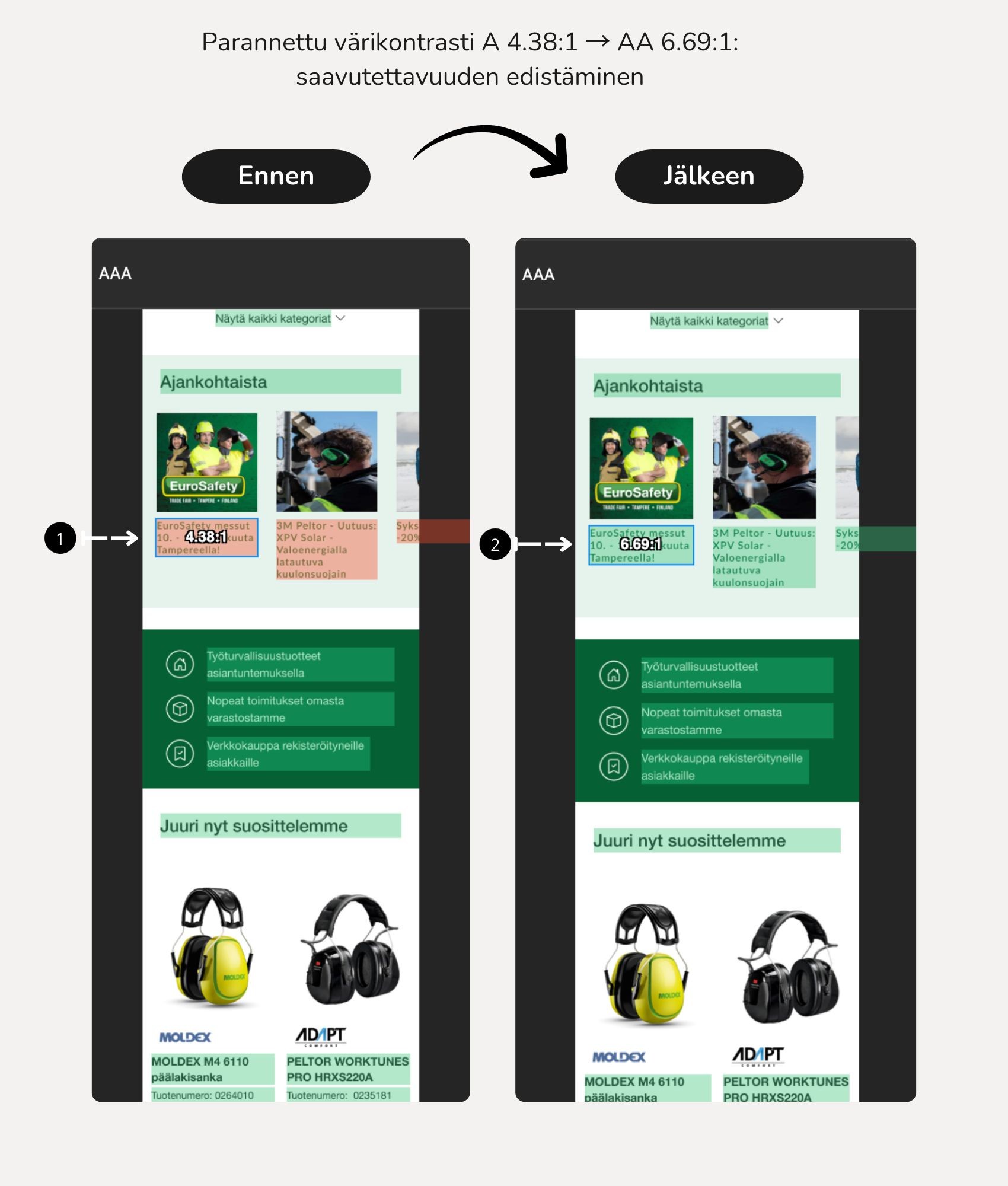EU directives in AI Commerce online store?
Businesses that utilize the AI Commerce e-commerce platform automatically gain access to all requirements in accordance with EU directives as part of continuous development. This means that businesses or e-commerce managers do not have to worry about these separately. With AI Commerce, for example, accessibility requirements, GDPR requirements, cookie settings, and VAT rules are always up to date.
EU directives in AI Commerce online store?
Businesses that utilize the AI Commerce e-commerce platform automatically gain access to all requirements in accordance with EU directives as part of continuous development. This means that businesses or e-commerce managers do not have to worry about these separately. With AI Commerce, for example, accessibility requirements, GDPR requirements, cookie settings, and VAT rules are always up to date.

Lauri Koskensalo
Head of Growth
3
my reading time
22.10.2024



Why are EU directives important?
EU directives set clear requirements for digital services to ensure that consumers' rights are protected and that all users can access services on an equal basis. For online stores, this means a continuous need to adapt their operations to comply with regulations and ensure their competitiveness.
1. Accessibility Directive
The Accessibility Directive ensures that digital services are available to everyone, including people with, for example, visual, auditory, or cognitive challenges. The directive requires that websites and services meet the criteria set by the WCAG (Web Content Accessibility Guidelines):
Perceivability: Content must be perceivable to all users.
Operability: The interface must be navigable and usable with assistive technologies.
Understandability: Content and the interface must be easy to understand.
Robustness: The site must work reliably with different technologies.
The AI Commerce platform provides continuously updated solutions to ensure compliance with accessibility requirements without separate actions.

2. GDPR or General Data Protection Regulation
With GDPR regulation, online stores must comply with strict rules regarding the handling of personal data. This includes, among other things:
The basis for data collection and processing: Personal data may only be collected on legal grounds, and the user must consent to the use of their data.
Data security: Companies must ensure the secure storage of personal data.
The right to be forgotten: Users have the right to request the deletion of their personal data.
AI Commerce supports compliance with GDPR requirements by providing tools for managing personal data and maintaining data protection regulations.

3. Cookie settings and the lowest price in the last 30 days
EU regulation also applies to the use of cookies on websites. Companies must inform users about what cookies are used and give them the opportunity to manage their settings. The AI Commerce platform includes integrated tools for cookie management.
Additionally, new regulations require that in discounted pricing, the product's lowest price in the last 30 days must be reported. This improves consumer protection and prevents misleading marketing practices.

4. Consumer protection directives
EU distance selling and consumer protection directives ensure that online shopping customers have the right to cancel their purchases within 14 days and receive full refunds. Companies must also provide clear information about the products, shipping costs, and any additional charges.
5. Directive on contracts for digital content and services
The contract directive for digital services and content ensures that products meet the agreed quality and are usable. Consumers have the right to demand compensation if the delivered content does not meet the agreed standard.
6. VAT Directive
The VAT directive particularly affects cross-border e-commerce. The 2021 reform requires that VAT must be paid according to the destination country's tax rate for intra-EU online purchases. AI Commerce supports automatic tax calculations according to the VAT rules of different countries.
Summary
EU directives impose significant requirements on online stores, but at the same time, they improve the quality of services and the consumer experience. The continuous development of the AI Commerce platform ensures that all essential regulations are met automatically, freeing businesses to focus on growing their operations. This allows online stores to operate confidently in an ever-changing digital environment.
Why are EU directives important?
EU directives set clear requirements for digital services to ensure that consumers' rights are protected and that all users can access services on an equal basis. For online stores, this means a continuous need to adapt their operations to comply with regulations and ensure their competitiveness.
1. Accessibility Directive
The Accessibility Directive ensures that digital services are available to everyone, including people with, for example, visual, auditory, or cognitive challenges. The directive requires that websites and services meet the criteria set by the WCAG (Web Content Accessibility Guidelines):
Perceivability: Content must be perceivable to all users.
Operability: The interface must be navigable and usable with assistive technologies.
Understandability: Content and the interface must be easy to understand.
Robustness: The site must work reliably with different technologies.
The AI Commerce platform provides continuously updated solutions to ensure compliance with accessibility requirements without separate actions.

2. GDPR or General Data Protection Regulation
With GDPR regulation, online stores must comply with strict rules regarding the handling of personal data. This includes, among other things:
The basis for data collection and processing: Personal data may only be collected on legal grounds, and the user must consent to the use of their data.
Data security: Companies must ensure the secure storage of personal data.
The right to be forgotten: Users have the right to request the deletion of their personal data.
AI Commerce supports compliance with GDPR requirements by providing tools for managing personal data and maintaining data protection regulations.

3. Cookie settings and the lowest price in the last 30 days
EU regulation also applies to the use of cookies on websites. Companies must inform users about what cookies are used and give them the opportunity to manage their settings. The AI Commerce platform includes integrated tools for cookie management.
Additionally, new regulations require that in discounted pricing, the product's lowest price in the last 30 days must be reported. This improves consumer protection and prevents misleading marketing practices.

4. Consumer protection directives
EU distance selling and consumer protection directives ensure that online shopping customers have the right to cancel their purchases within 14 days and receive full refunds. Companies must also provide clear information about the products, shipping costs, and any additional charges.
5. Directive on contracts for digital content and services
The contract directive for digital services and content ensures that products meet the agreed quality and are usable. Consumers have the right to demand compensation if the delivered content does not meet the agreed standard.
6. VAT Directive
The VAT directive particularly affects cross-border e-commerce. The 2021 reform requires that VAT must be paid according to the destination country's tax rate for intra-EU online purchases. AI Commerce supports automatic tax calculations according to the VAT rules of different countries.
Summary
EU directives impose significant requirements on online stores, but at the same time, they improve the quality of services and the consumer experience. The continuous development of the AI Commerce platform ensures that all essential regulations are met automatically, freeing businesses to focus on growing their operations. This allows online stores to operate confidently in an ever-changing digital environment.
Why are EU directives important?
EU directives set clear requirements for digital services to ensure that consumers' rights are protected and that all users can access services on an equal basis. For online stores, this means a continuous need to adapt their operations to comply with regulations and ensure their competitiveness.
1. Accessibility Directive
The Accessibility Directive ensures that digital services are available to everyone, including people with, for example, visual, auditory, or cognitive challenges. The directive requires that websites and services meet the criteria set by the WCAG (Web Content Accessibility Guidelines):
Perceivability: Content must be perceivable to all users.
Operability: The interface must be navigable and usable with assistive technologies.
Understandability: Content and the interface must be easy to understand.
Robustness: The site must work reliably with different technologies.
The AI Commerce platform provides continuously updated solutions to ensure compliance with accessibility requirements without separate actions.

2. GDPR or General Data Protection Regulation
With GDPR regulation, online stores must comply with strict rules regarding the handling of personal data. This includes, among other things:
The basis for data collection and processing: Personal data may only be collected on legal grounds, and the user must consent to the use of their data.
Data security: Companies must ensure the secure storage of personal data.
The right to be forgotten: Users have the right to request the deletion of their personal data.
AI Commerce supports compliance with GDPR requirements by providing tools for managing personal data and maintaining data protection regulations.

3. Cookie settings and the lowest price in the last 30 days
EU regulation also applies to the use of cookies on websites. Companies must inform users about what cookies are used and give them the opportunity to manage their settings. The AI Commerce platform includes integrated tools for cookie management.
Additionally, new regulations require that in discounted pricing, the product's lowest price in the last 30 days must be reported. This improves consumer protection and prevents misleading marketing practices.

4. Consumer protection directives
EU distance selling and consumer protection directives ensure that online shopping customers have the right to cancel their purchases within 14 days and receive full refunds. Companies must also provide clear information about the products, shipping costs, and any additional charges.
5. Directive on contracts for digital content and services
The contract directive for digital services and content ensures that products meet the agreed quality and are usable. Consumers have the right to demand compensation if the delivered content does not meet the agreed standard.
6. VAT Directive
The VAT directive particularly affects cross-border e-commerce. The 2021 reform requires that VAT must be paid according to the destination country's tax rate for intra-EU online purchases. AI Commerce supports automatic tax calculations according to the VAT rules of different countries.
Summary
EU directives impose significant requirements on online stores, but at the same time, they improve the quality of services and the consumer experience. The continuous development of the AI Commerce platform ensures that all essential regulations are met automatically, freeing businesses to focus on growing their operations. This allows online stores to operate confidently in an ever-changing digital environment.

Lauri Koskensalo
Head of Growth
Lauri is an e-commerce technology expert and the sales director of AI Commerce. He helps companies grow with modern solutions and enjoys discussing the development of e-commerce.
info@aicommerce.fi
You might also be interested in
Frequently Asked Questions
What is AI Commerce and how does it work?
Where does the name AI Commerce come from?
What kind of company is AI Commerce suitable for?
How long are the contracts?
What kind of pricing models are available?
Are there any separate setup costs involved in the implementation of AI Commerce?
With whom can I develop my online store?
I am considering moving to AI Commerce. How can I transfer my information?
Is technical support or guidance available to the user?
Is the software cloud-based?
Frequently Asked Questions
What is AI Commerce and how does it work?
Where does the name AI Commerce come from?
What kind of company is AI Commerce suitable for?
How long are the contracts?
What kind of pricing models are available?
Are there any separate setup costs involved in the implementation of AI Commerce?
With whom can I develop my online store?
I am considering moving to AI Commerce. How can I transfer my information?
Is technical support or guidance available to the user?
Is the software cloud-based?
Frequently Asked Questions
What is AI Commerce and how does it work?
Where does the name AI Commerce come from?
What kind of company is AI Commerce suitable for?
How long are the contracts?
What kind of pricing models are available?
Are there any separate setup costs involved in the implementation of AI Commerce?
With whom can I develop my online store?
I am considering moving to AI Commerce. How can I transfer my information?
Is technical support or guidance available to the user?
Is the software cloud-based?
GDPR
COMPLIANT
Future-proof eCommerce built in the EU
Our solution is developed and hosted in the EU, fully compliant with GDPR and other regulatory requirements. Gain peace of mind with secure data handling, reliable support, and a transparent European partner.
© 2025 AI Commerce. All rights reserved.
GDPR
COMPLIANT
Future-proof eCommerce built in the EU
Our solution is developed and hosted in the EU, fully compliant with GDPR and other regulatory requirements. Gain peace of mind with secure data handling, reliable support, and a transparent European partner.
© 2025 AI Commerce. All rights reserved.
GDPR
COMPLIANT
Future-proof eCommerce built in the EU
Our solution is developed and hosted in the EU, fully compliant with GDPR and other regulatory requirements. Gain peace of mind with secure data handling, reliable support, and a transparent European partner.
© 2025 AI Commerce. All rights reserved.




